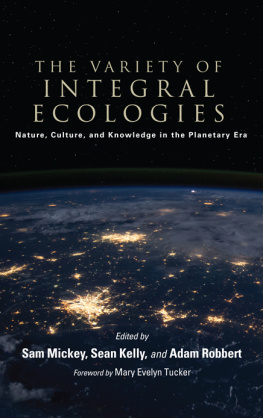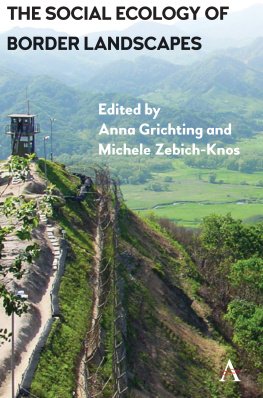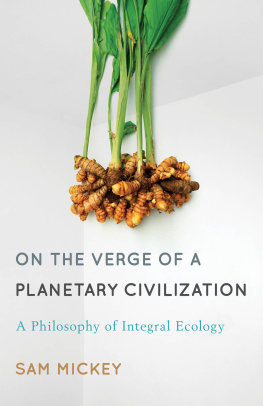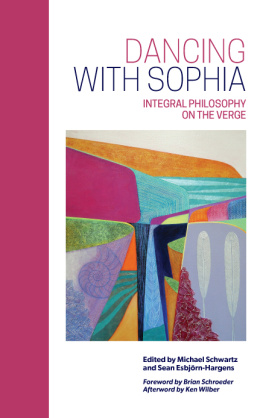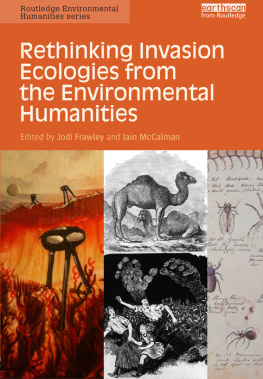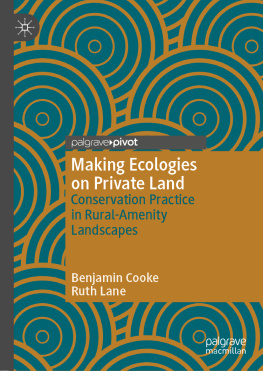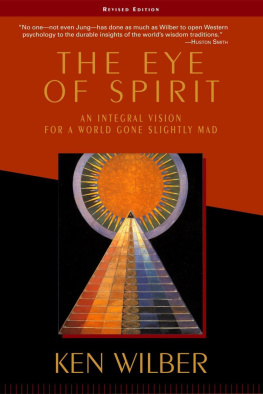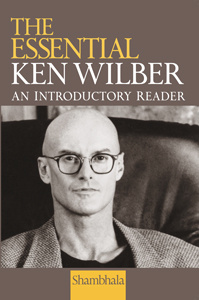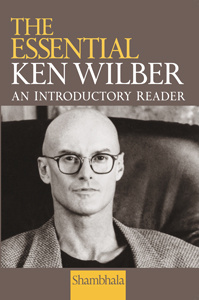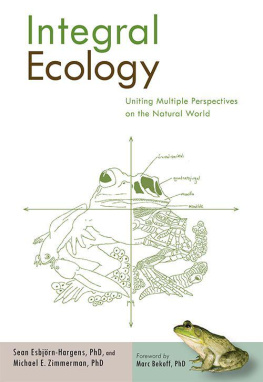THE VARIETY OF
INTEGRAL
ECOLOGIES
SUNY series in Integral Theory
Sean Esbjrn-Hargens, editor
THE VARIETY OF
INTEGRAL
ECOLOGIES
Nature, Culture, and Knowledge
in the Planetary Era
Edited by
Sam Mickey, Sean Kelly,
and Adam Robbert
Foreword by Mary Evelyn Tucker
Published by State University of New York Press, Albany
2017 State University of New York
All rights reserved
Printed in the United States of America
No part of this book may be used or reproduced in any manner whatsoever without written permission. No part of this book may be stored in a retrieval system or transmitted in any form or by any means including electronic, electrostatic, magnetic tape, mechanical, photocopying, recording, or otherwise without the prior permission in writing of the publisher.
For information, contact State University of New York Press, Albany, NY
www.sunypress.edu
Production, Ryan Morris
Marketing, Fran Keneston
Library of Congress Cataloging-in-Publication Data
Names: Mickey, Sam, 1981- editor. | Kelly, Sean M., 1957- editor. | Robbert, Adam, 1984- editor.
Title: The variety of integral ecologies : nature, culture, and knowledge in the planetary era / edited by Sam Mickey, Sean Kelly, and Adam Robbert.
Description: Albany : State University of New York Press, [2017] | Series: SUNY series in integral theory | Includes bibliographical references and index.
Identifiers: LCCN 2016031416| ISBN 9781438465272 (hardcover : alk. paper) | ISBN 9781438465289 (pbk. : alk. paper) | ISBN 9781438465296 (e-book)
Subjects: LCSH: Ecological integrity. | Ecology--Study and teaching. | Environmental sciences.
Classification: LCC QH541.15.E245 V37 2017 | DDC 577.076--dc23 LC record available at https://lccn.loc.gov/2016031416
10 9 8 7 6 5 4 3 2 1
CONTENTS
Mary Evelyn Tucker
Sam Mickey, Sean Kelly, and Adam Robbert
Sam Mickey
Sean Esbjrn-Hargens and Michael E. Zimmerman
Sean Kelly
Michael E. Zimmerman
Mark D. Hathaway
Elizabeth Allison
Sean Kelly
Adam Robbert and Sam Mickey
Adrian Ivakhiv
Sean Esbjrn-Hargens
Annick De Witt and Nicholas Hedlund
Karen T. Litfin
ILLUSTRATIONS
FIGURES
TABLES
.
ACKNOWLEDGMENTS
T HIS BOOK HAS BEEN MANY YEARS in the making. The three of us started planning this anthology in the fall of 2010. In the years since, many people, places, events, and institutions have provided support for this work. We are grateful to SUNY Press and Nancy Ellegate for ushering this book through the publication process. Many thanks are also owed to the Philosophy, Cosmology, and Consciousness Department at the California Institute of Integral Studies (CIIS) in San Francisco. The creative potential of that academic milieu provided the impetus for us to pursue this project. It was during a departmental retreat that we first envisioned this anthology. Many students, faculty, and staff of CIIS have supported the development of this book and of integral ecologies in general. We also want to thank Sean Esbjrn-Hargens at MetaIntegral for supporting this work and for including integral ecologies in the Integral Theory Conference. Special thanks are also due to Esbjrn-Hargens for editing the SUNY series on integral theory, of which the present volume is a part. We also want to acknowledge Mary Evelyn Tucker and John Grim. They have been a source of encouragement and guidance along the way to this anthology, and their groundbreaking work with the Forum on Religion and Ecology at Yale is exemplary of integral ecologies.
Each of us would like to make some specific acknowledgments. Sam would like to thank everyone in the Environmental Studies program and the Theology and Religious Studies department at the University of San Francisco, where he has been teaching since 2008. Those thanks also extend to Dominican University of California and Pacifica Graduate Institute, where Sam has also held teaching appointments. Sam would also like to express his gratitude for the boundless love and care of his family, with special thanks to Bob, Cindy, and Sabrina, and extra-special thanks to the incomparable fire of Kim Carfore.
Sean would like to acknowledge Sean Esbjrn-Hargens for his leading role in catalyzing the field of integral ecologies and for his continuing support in ensuring robust diversity in the field. Sean is also grateful to his colleagues in the Philosophy, Cosmology, and Consciousness department at CIIS (Robert McDermott, Richard Tarnas, Brian Swimme, Elizabeth Allison, and David Ulansey) and to its graduate students (with special thanks to Elizabeth McAnally) for their support in creating a track in integral ecologies in our program. Finally, Sean is grateful to his wife, Yuka Saito, for her unflagging moral support.
Adam would like to thank and acknowledge his parents, Helena and Michael, his sister and brother-in-law, Anna and Erik, his partner in life, Samantha, and his philosophical peers and comrades at the California Institute of Integral Studies, Matt, Becca, Travis, Becky, Aaron, Heidi, Tom, Adam D., Adam H., Sam, Kim, Brian, Jonathan, Jim, Jesse, and Nick. A special thanks goes out to Sean Kelly and Brian Swimme for shepherding this young graduate student through his course work and thesis.
Finally, we would be remiss if we failed to acknowledge the myriad multi-species networks and material conditions that made this book possible. This book is not just about humans, and likewise, it is not just for humans. It is our hope that this book is of benefit for the multitude of human and nonhuman members composing the Earth community.
FOREWORD
Mary Evelyn Tucker
T HIS BOOK IS A REMARKABLE COLLECTION of provocative essays that reflect the spectrum of new and emerging integral ecologies. While the term integral ecology arose some 20 years ago in various contexts, with the papal encyclical, Laudato Si , it is receiving fresh attention referring to the conjunction of ecological and social issues. Thus, the timeliness of this book is noteworthy.
But what makes it not only timely but also valuable?
I would suggest several things: the critical state of the planet, the need for interconnected and interdisciplinary responses, the acknowledgment of different ways of knowing, and the effort to respect but also overcome differences in searching for solutions.
We need not recite the litany of problems undermining both Earths ecosystems and human social systems. This book begins with an understanding of the interconnected nature of these problems. No longer can we think of environmental issues and social challenges as separate. That is the contribution of exploring the variety of integral ecologies in these essaysto see what we have been missing.
It is clear that the environmental problems in which we are immersed are overwhelmingly complexclimate change, biodiversity loss, pollution. Indeed, some people are calling them wicked problems that will require radical and fresh solutions. Others are wondering whether we have already reached a tipping point beyond which there is no return. They are asking: Has the Earth become so saturated with pollution, so burdened with loss of species, and so altered by climate disruption, that mitigation is no longer possible? Are we able to manage our planet and its dynamic ecosystems, or are the problems so intractable and interconnected that genuine solutions elude us?

